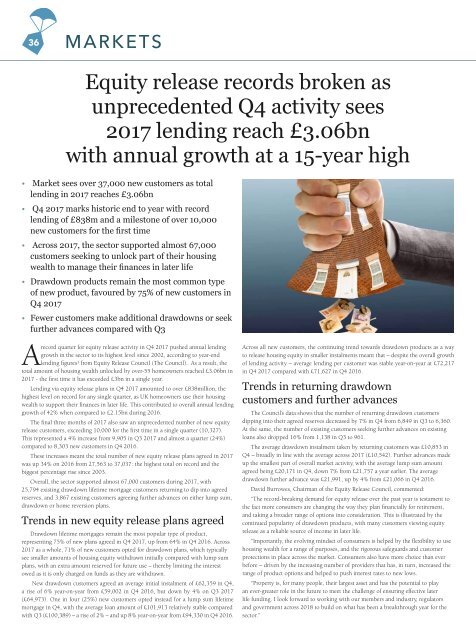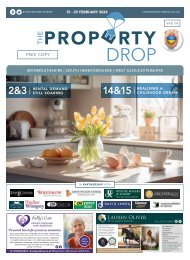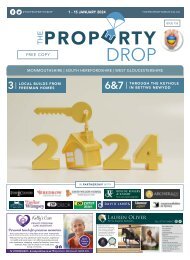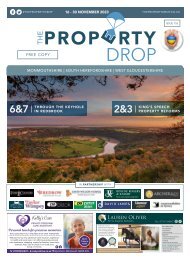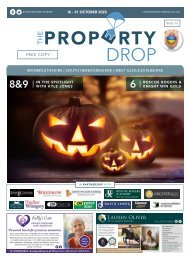Create successful ePaper yourself
Turn your PDF publications into a flip-book with our unique Google optimized e-Paper software.
36 MARKETS<br />
Equity release records broken as<br />
unprecedented Q4 activity sees<br />
2017 lending reach £3.06bn<br />
with annual growth at a 15-year high<br />
• Market sees over 37,000 new customers as total<br />
lending in 2017 reaches £3.06bn<br />
• Q4 2017 marks historic end to year with record<br />
lending of £838m and a milestone of over 10,000<br />
new customers for the first time<br />
• Across 2017, the sector supported almost 67,000<br />
customers seeking to unlock part of their housing<br />
wealth to manage their finances in later life<br />
• Drawdown products remain the most common type<br />
of new product, favoured by 75% of new customers in<br />
Q4 2017<br />
• Fewer customers make additional drawdowns or seek<br />
further advances compared with Q3<br />
A<br />
record quarter for equity release activity in Q4 2017 pushed annual lending<br />
growth in the sector to its highest level since 2002, according to year-end<br />
lending figures¹ from Equity Release Council (The Council). As a result, the<br />
total amount of housing wealth unlocked by over-55 homeowners reached £3.06bn in<br />
2017 - the first time it has exceeded £3bn in a single year.<br />
Lending via equity release plans in Q4 2017 amounted to over £838million, the<br />
highest level on record for any single quarter, as UK homeowners use their housing<br />
wealth to support their finances in later life. This contributed to overall annual lending<br />
growth of 42% when compared to £2.15bn during 2016.<br />
The final three months of 2017 also saw an unprecedented number of new equity<br />
release customers, exceeding 10,000 for the first time in a single quarter (10,327).<br />
This represented a 4% increase from 9,905 in Q3 2017 and almost a quarter (24%)<br />
compared to 8,303 new customers in Q4 2016.<br />
These increases meant the total number of new equity release plans agreed in 2017<br />
was up 34% on 2016 from 27,563 to 37,037: the highest total on record and the<br />
biggest percentage rise since 2003.<br />
Overall, the sector supported almost 67,000 customers during 2017, with<br />
25,794 existing drawdown lifetime mortgage customers returning to dip into agreed<br />
reserves, and 3,867 existing customers agreeing further advances on either lump sum,<br />
drawdown or home reversion plans.<br />
Trends in new equity release plans agreed<br />
Drawdown lifetime mortgages remain the most popular type of product,<br />
representing 75% of new plans agreed in Q4 2017, up from 64% in Q4 2016. Across<br />
2017 as a whole, 71% of new customers opted for drawdown plans, which typically<br />
see smaller amounts of housing equity withdrawn initially compared with lump sum<br />
plans, with an extra amount reserved for future use – thereby limiting the interest<br />
owed as it is only charged on funds as they are withdrawn.<br />
New drawdown customers agreed an average initial instalment of £62,359 in Q4,<br />
a rise of 6% year-on-year from £59,002 in Q4 2016, but down by 4% on Q3 2017<br />
(£64,973). One in four (25%) new customers opted instead for a lump sum lifetime<br />
mortgage in Q4, with the average loan amount of £101,913 relatively stable compared<br />
with Q3 (£100,389) – a rise of 2% – and up 8% year-on-year from £94,330 in Q4 2016.<br />
Across all new customers, the continuing trend towards drawdown products as a way<br />
to release housing equity in smaller instalments meant that – despite the overall growth<br />
of lending activity – average lending per customer was stable year-on-year at £72,<strong>21</strong>7<br />
in Q4 2017 compared with £71,627 in Q4 2016.<br />
Trends in returning drawdown<br />
customers and further advances<br />
The Council’s data shows that the number of returning drawdown customers<br />
dipping into their agreed reserves decreased by 7% in Q4 from 6,849 in Q3 to 6,360.<br />
At the same, the number of existing customers seeking further advances on existing<br />
loans also dropped 16% from 1,138 in Q3 to 961.<br />
The average drawdown instalment taken by returning customers was £10,853 in<br />
Q4 – broadly in line with the average across 2017 (£10,542). Further advances made<br />
up the smallest part of overall market activity, with the average lump sum amount<br />
agreed being £20,171 in Q4, down 7% from £<strong>21</strong>,757 a year earlier. The average<br />
drawdown further advance was £<strong>21</strong>,991, up by 4% from £<strong>21</strong>,066 in Q4 2016.<br />
David Burrowes, Chairman of the Equity Release Council, commented:<br />
“The record-breaking demand for equity release over the past year is testament to<br />
the fact more consumers are changing the way they plan financially for retirement,<br />
and taking a broader range of options into consideration. This is illustrated by the<br />
continued popularity of drawdown products, with many customers viewing equity<br />
release as a reliable source of income in later life.<br />
“Importantly, the evolving mindset of consumers is helped by the flexibility to use<br />
housing wealth for a range of purposes, and the rigorous safeguards and customer<br />
protections in place across the market. Consumers also have more choice than ever<br />
before – driven by the increasing number of providers that has, in turn, increased the<br />
range of product options and helped to push interest rates to new lows.<br />
“<strong>Property</strong> is, for many people, their largest asset and has the potential to play<br />
an ever-greater role in the future to meet the challenge of ensuring effective later<br />
life funding. I look forward to working with our members and industry, regulators<br />
and government across 2018 to build on what has been a breakthrough year for the<br />
sector.”


